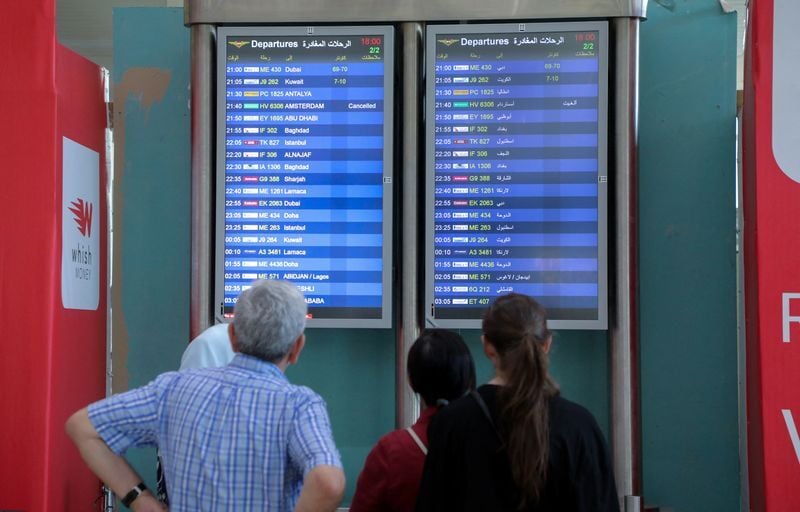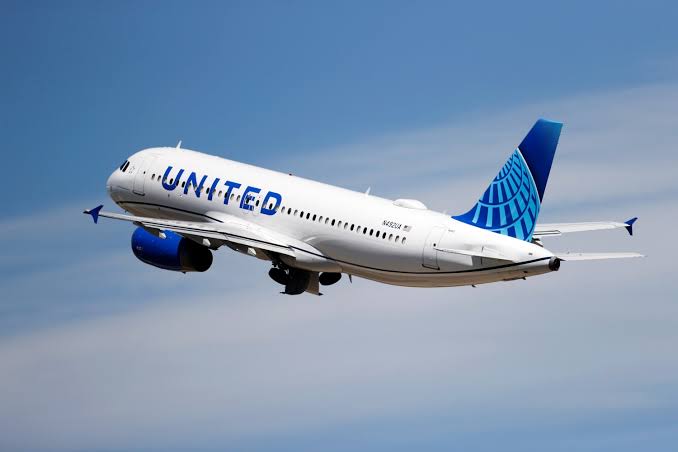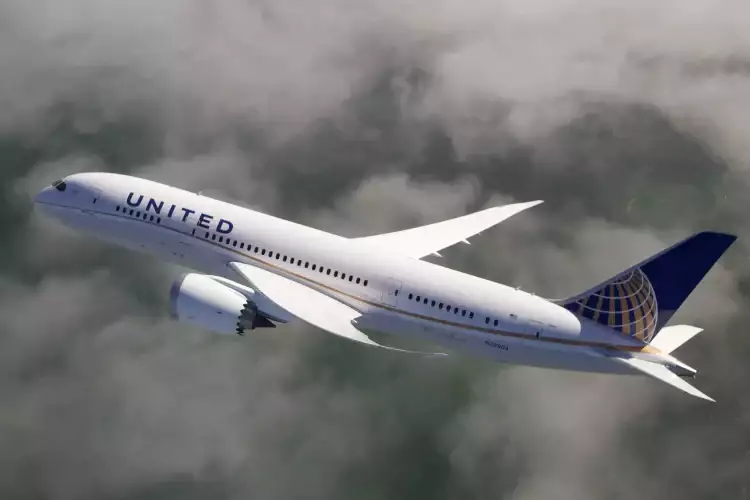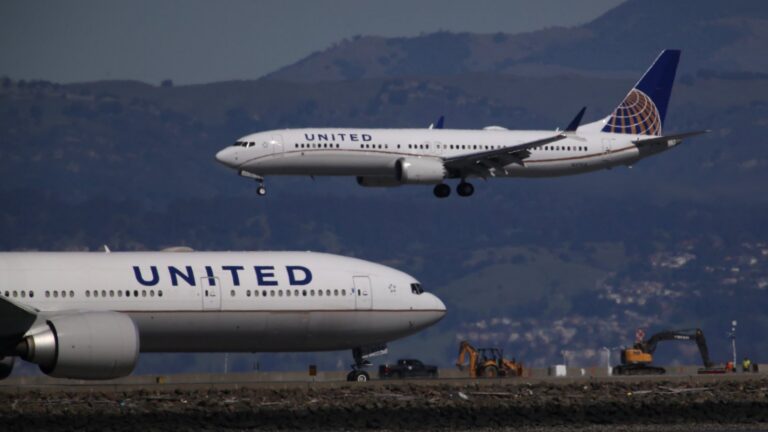Beirut flights cancelled or delayed amid fears of Israeli attack
Flights to and from Beirut airport were cancelled or delayed on Monday as tensions escalated between Israel and armed political group Hezbollah after a strike in the Israeli-occupied Golan Heights killed 12 children and teenagers.
Air France said on Monday that due to the security situation at the destination, it will suspend flights between Paris-Charles de Gaulle and Beirut for the days of July 29 and 30, 2024.”Air France is monitoring the situation in Lebanon in real time,” the airline said.
Lufthansa, Swiss and Eurowings of the Lufthansa Group have decided to suspend their flights from and to Beirut up to and including Aug. 5 due to the current developments in the Middle East, a group spokesperson said.
Lebanon’s Middle East Airlines (MEA) said disruptions to its schedule were related to insurance risks.The rocket strike in the Golan Heights on Saturday has added to concerns that Israel and the Iran-backed group could engage in a full-scale war.
Israel’s security cabinet on Sunday authorised the government to respond to the strike. Hezbollah denied any responsibility for the attack, the deadliest in Israel or Israeli-annexed territory since Hamas’ Oct. 7 assault sparked the war in Gaza, which has since spread to several fronts.
Beirut airport’s flight information board and flight tracking website Flightradar24 show Turkish Airlines also cancelled two flights overnight on Sunday.Turkey-based budget carrier SunExpress, Turkish Airlines subsidiary AJet, Greek carrier Aegean Airlines, Ethiopian Air and MEA have also cancelled flights scheduled to land in Beirut on Monday, Flightradar24 shows.
The airlines did not immediately respond to requests for comment.
Beirut-Rafic Hariri International Airport is Lebanon’s only airport. It has been targeted in the country’s civil war, and previous fighting with Israel, including in the last war between Hezbollah and Israel in 2006.
On Sunday, MEA said it had delayed the departure of some flights set to land in Beirut overnight. Additional delays to flights landing on Monday were then announced due to “technical reasons related to the distribution of insurance risks for aircraft between Lebanon and other destinations”, MEA said.
Hezbollah and the Israeli military have increased cross-border exchanges of fire since the Gaza war began. The conflict has disrupted flights and shipping across the region, including during reciprocal drone and missile attacks between Israel and Iran in April.
Lufthansa has already suspended night-time flights to and from Beirut for July due to “current developments” in the Middle East.
Recent escalations in the Middle East have led to significant disruptions in air travel to and from Beirut, Lebanon. Following a deadly rocket strike in the Israeli-occupied Golan Heights that killed 12 children and teenagers, airlines have been reevaluating their operations to ensure the safety of their passengers and crew. The tensions between Israel and Hezbollah, an armed political group backed by Iran, have intensified, prompting several airlines to cancel or delay flights to Beirut-Rafic Hariri International Airport, Lebanon’s only airport.
Air France announced on Monday that it would suspend flights between Paris-Charles de Gaulle and Beirut on July 29 and 30, 2024, citing the security situation in Lebanon. “Air France is monitoring the situation in Lebanon in real time,” the airline stated, highlighting the volatile and rapidly changing conditions on the ground.
The Lufthansa Group, including its subsidiaries Lufthansa, Swiss, and Eurowings, also decided to suspend their flights to and from Beirut until at least August 5. A spokesperson for the group mentioned that this decision was due to “current developments in the Middle East,” underscoring the broader regional instability affecting travel plans.
Lebanon’s national carrier, Middle East Airlines (MEA), reported disruptions to its schedule primarily due to insurance risks. The recent rocket strike in the Golan Heights has heightened concerns about a potential full-scale war between Israel and Hezbollah, further complicating the operational environment for airlines. MEA has faced additional challenges, including the need to manage the distribution of insurance risks for its aircraft flying between Lebanon and other destinations.
The impact of these tensions is evident on Beirut airport’s flight information board and flight tracking website Flightradar24, which show cancellations by several airlines. Turkish Airlines canceled two flights overnight on Sunday, and other carriers, including SunExpress, AJet (a Turkish Airlines subsidiary), Aegean Airlines, Ethiopian Airlines, and MEA, also canceled flights scheduled to land in Beirut on Monday. Despite the ongoing disruptions, these airlines did not immediately respond to requests for comment, reflecting the uncertainty and fluidity of the situation.
Beirut-Rafic Hariri International Airport has a history of being targeted during conflicts, including Lebanon’s civil war and previous clashes with Israel, such as the 2006 war between Hezbollah and Israel. The current situation has once again placed the airport at the center of regional conflict, disrupting travel and causing significant delays.
On Sunday, MEA announced delays for some flights scheduled to land in Beirut overnight, attributing these delays to “technical reasons related to the distribution of insurance risks.” This cautious approach by MEA highlights the complexities of operating in a conflict zone, where insurance coverage and risk management become critical considerations.
The broader context of these disruptions includes increased cross-border exchanges of fire between Hezbollah and the Israeli military since the Gaza war began. The conflict has affected not only air travel but also shipping and other forms of transportation across the region. In April, reciprocal drone and missile attacks between Israel and Iran further complicated the security landscape, demonstrating the far-reaching implications of the ongoing conflict.
Lufthansa had already suspended night-time flights to and from Beirut for July, citing “current developments” in the Middle East. This preemptive measure indicates the airline’s proactive stance in mitigating risks associated with the region’s instability.
As tensions continue to rise, airlines and passengers must navigate an increasingly complex and unpredictable environment. The safety and security of travelers remain the top priority, prompting airlines to make difficult decisions about suspending or delaying flights. These measures, while disruptive, are essential to ensure that passengers and crew members are not placed in harm’s way.
The current situation serves as a reminder of the broader geopolitical dynamics at play in the Middle East, where local conflicts can have far-reaching impacts on international travel and commerce. Airlines operating in this region must remain vigilant, constantly monitoring the security environment and adjusting their operations accordingly.
For travelers, this means staying informed and flexible, ready to adapt to sudden changes in flight schedules and travel plans. It is crucial to maintain close communication with airlines and monitor official updates from governmental and embassy sources.
In summary, the recent escalations between Israel and Hezbollah have led to significant disruptions in air travel to and from Beirut. Airlines such as Air France, Lufthansa, Swiss, Eurowings, and Middle East Airlines have suspended or delayed flights due to the volatile security situation. These measures reflect a cautious approach to risk management in a conflict zone, prioritizing the safety of passengers and crew. As the situation evolves, both airlines and travelers must remain adaptable and informed to navigate the challenges posed by the ongoing conflict in the Middle East.






